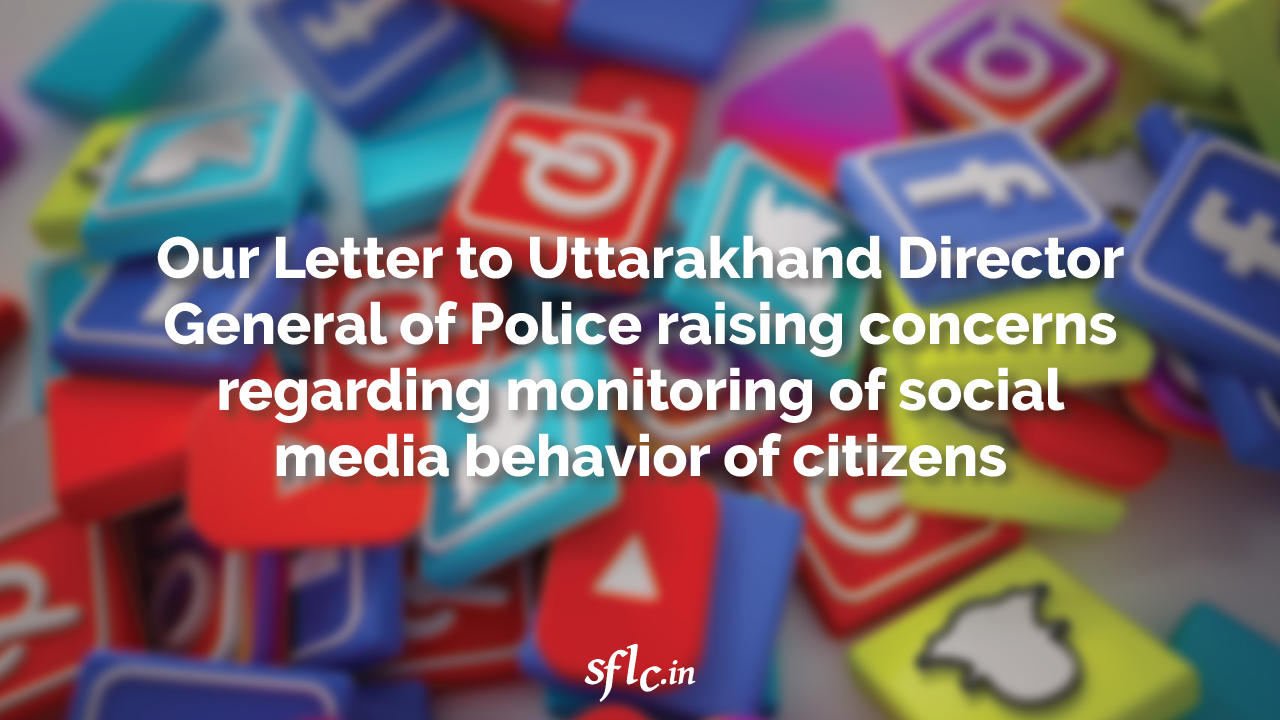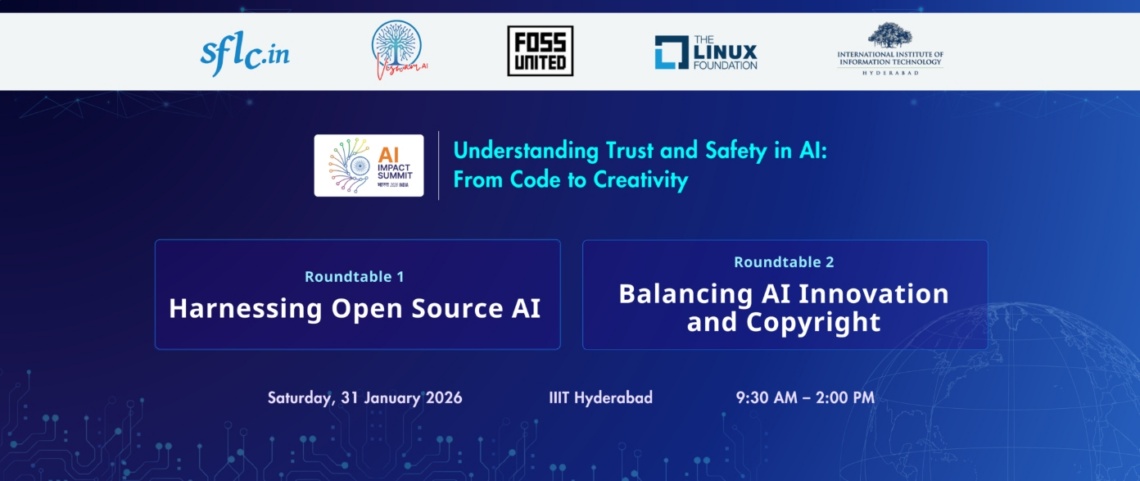Our Letter to Uttarakhand Director General of Police raising concerns regarding monitoring of social media behavior of citizens
As indicated by recent media reports, Uttarakhand police has expressed its intent to monitor the social media behavior of citizens. As per the statement given by the state Director General of Police, if a citizen was habitually putting “anti-national” posts, the police would mention it in his/her police verification and may not clear the application for passport or arms license.
Any executive action should be in line with the constitutional principles and it should not infringe upon the right to freedom of speech of the citizens.
In our letter, we have urged the Uttarakhand DG to rethink the action which is being contemplated by the state Police.
You can read the letter here:
February 13th, 2021
To,
Shri Ashok Kumar,
DGP Uttarakhand
Police Headquarters
12 Subhash Road
Dehradun
Respected Sir,
Subject: “Concern regarding monitoring of social media behaviour of citizens by Uttarakhand Police for verification of passports”
Greetings from SFLC.IN!
SFLC.IN is the first Indian legal services organization that works exclusively on technology, law, and policy. As a not-for-profit organization engaged in the empowerment of Indian citizens about their digital freedom and rights, it operates as a collective bringing together different stakeholders to a common platform to further the cause of digital rights. SFLC.in promotes innovation and open access to knowledge by helping policy makers make informed and just decisions regarding the use and adoption of technology. As of 2020, SFLC.in is the only Indian organization to be inducted as a member of the IFEX, a global network to defend the right to freedom of expression and information.
We write this letter to voice our concerns about a recent statement which has been attributed to you, in relation to monitoring of social media behaviour of citizens. News reports in the past few days have indicated that on the concluding day of the state police officers’ conference at the police headquarters in Dehradun, you reportedly said, “From now onwards, the police will scrutinize the accused’s social media behaviour to check if he is habitually putting such anti-national posts. If it is found so, then the police would mention it in his/her police verification and may not clear his application for passport or arms license.”
It is important to note that the action being contemplated in the aforementioned statement is without any statutory backing. There is no law that grants any authority to the state police to take such an action. Under the Passports act, 1967, discretion in respect of actions such as issuance of an endorsement, passport or travel document; or impounding or revoking a passport or a travel document, rests solely with the “passport authority”. There is no such power or authority which has been bestowed upon the police which allows it to examine the social media conduct of citizens and make a decision on its own accord. Such an action would tantamount to being arbitrary and would have a catastrophic effect on the rights of citizens to express themselves on the online space.
The right to freedom of speech and expression as enshrined under Article 19(1)(a) of the Constitution of India implies that every citizen has a right to express his or her views freely. This freedom also extends to the online or the digital space. The steps being contemplated by Uttarakhand police in respect of monitoring of social media behaviour of citizens, causes an undue and illegitimate impediment in the exercise of right to freedom of speech and expression.
Unless convicted for an offence by a court of competent jurisdiction, ascertainment of an individual’s guilt or in this case, his or her being “anti-national” or being a threat to the sovereignty or integrity of India, cannot be made solely on the basis of an individual’s social media behaviour. As a standard practice, whether or not a case was pending against an individual or an FIR had been filed against the said individual, are some of the grounds which should be taken into consideration while verification of passport is being done.
There are often complaints raised about harassment of passport applicants during the police verification process. A policy that further bestows more power upon the police is bound to make this situation even worse. Furthermore, there is considerable ambiguity in the meaning and interpretation of the word “antinational”. In absence of a statutory definition of the term, coupled with the pre-existing problem of harassment by the police, there is a likelihood that the police monitoring social media behaviour of the citizens will have a chilling effect on the exercise of right to freedom of speech and expression. Such a practice could also gives rise to a possibility where the police is used by the state machinery to suppress dissent or criticism against the government or its actions. This also gives unbridled powers to the police, without there being a constitutional prerogative to that effect.
As held in the case of Satwant Singh Sawhney vs. D. Ramarathnam 1967 AIR 1836, the right to travel abroad is a part of a person’s personal liberty of which he or she cannot be deprived, except according to the procedure established by law in terms of Article 21 of the Constitution. There is no procedure established by law that grants such wide powers to the police and therefore the actions being contemplated in respect of monitoring of social media account of citizens for passport verification, should be done away with.
In light of the points mentioned in this letter, we urge you to rethink the actions which are being contemplated as per your statement. It is imperative that Uttarakhand Police should attune all its future actions in line with the values and principles enshrined in our constitution. It must be ensured that no action or policy decision should authorize or permit the police to monitor the social media behaviour of citizens, for the purpose of passport verification. We request that any steps which are being taken in furtherance of such an action should be immediately stopped and a clarification should be given by your office to allay the fears which have arisen in the minds of citizens.
We hope that due consideration will be paid to the concerns highlighted in this letter and the actions which are reflected in the statement issued by you, will not be manifested in any policy decisions. The right to freedom of speech and expression is an essential tenet of any democracy and it should be protected against any executive action that is arbitrary and unconstitutional.
Yours Sincerely,
Prasanth Sugathan
Legal Director,
SFLC.IN
prasanth@sflc.in




